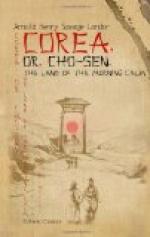“Well, you see, the American and Oppert took advantage of their appearance in Shanghai to let people believe that they were high officials sent over by the king, who was anxious to send an embassy to the different courts of Europe to explain the slaughter of foreigners which had taken place in his country, and also with the object of entering, if possible, into treaties with the different European monarchs—in fact to open his country to foreign trade and commerce. It seemed somewhat a large order to any one who knew of the retiring nature of the king, but everything was done so quickly that the expedition was gone before people had time to inquire into its real object.
“The fleet, as I have remarked, in due time started, and after calling on its way at Nagasaki, where rifles and other firearms and ammunition were purchased with which to arm the military escort, steered a course to the mouth of the Han river. Among the eight Europeans of dubious character on board was a Frenchman, a Jesuit priest, who called himself Farout, but whose real name was Feron, and who played an important part in the piratical scheme, for, having lived some time previously in Corea, he had mastered the language. Besides, he had travelled a good deal along the river Han, so that he was entrusted with the responsible position of guide and interpreter to the body-snatchers!”
“Curious position for a missionary to occupy,” I could not help remarking.
“Yes. They reached Prince Jerome’s Gulf on the 8th of May, and the next day, sounding continually, slowly steamed up the river Han to a point where it was deemed advisable to man the tender and smaller rowing-boats with a view to completing the expedition in these.
“This plan was successfully carried out, and during the night, under the command of Oppert, and escorted by the marauders, who were armed to the teeth, they proceeded to the point where l’Abbe Feron advised a landing. Here, making no secret of their designs, they ill-treated the natives, and pillaged their poor huts, after which they made their way to the tomb, where the relics lay of some royal personage supposed to have been buried there with mountains of gold and precious jewels, which relics were held in much veneration by the great Regent, the Tai-wen-kun. The impudent scheme, in a few words, was this: to take the natives by surprise, dig the body quickly out of its underground place of what should have been eternal rest, and take possession of anything valuable that might be found in the grave. The disturbed bones of the unfortunate prince were to be carried on board, and a high ransom was to be extorted from the great Regent, who they thought would offer any sum to get back the cherished bones of his ancestor.
“The march from the landing-place to the tomb occupied longer than had been anticipated, and crowds of astonished and angry natives followed the procession of armed men. The latter finally reached the desired spot, a funny little semi-spherical mound of earth, with a few stone figures of men and ponies roughly carved on either side, and guarded by two stone slabs.




